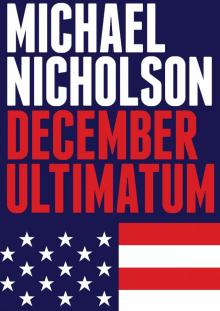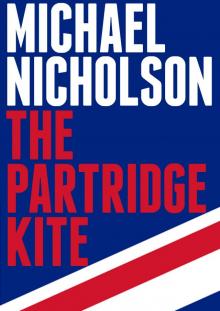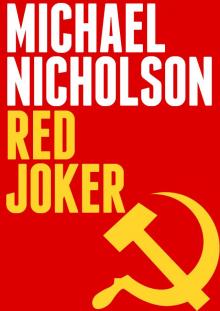- Home
- Michael Nicholson
December Ultimatum
December Ultimatum Read online
Contents
Dedication5
December 20th6
Radio Riyadh7
LONDON8
WASHINGTON10
RIYADH12
WASHINGTON 20
December 21st29
RIYADH30
BONN33
PERSIAN GULF35
CAIRO38
CAMP DAVID43
LONDON46
THE PRESIDENT’S SPEECH49
THE STRAIT OF HORMUZ53
LONDON—DUBLIN56
December 23rd64
US, NATIONWIDE65
GREAT BRITAIN67
ULLSWATER72
USS OKINAWA74
WASHINGTON78
OPERATION SNOWBALL85
ULLSWATER93
Christmas Eve97
WASHINGTON98
PUBLISHING INFORMATION107
For Denis and Edith Slater, with gratitude and affection.
December 20th
Radio Riyadh
‘This is the Islamic People’s Democratic Republic broadcasting to the world from Riyadh.
‘The House of Ibn Saud has been deposed. The leadership of the new Saudi Arabian Republic has been accepted by Rahbar, the supreme leader.
‘After a day and night of heroic fighting, commandos of the Islamic People’s Revolutionary Forces are victorious and have occupied the Palace of King Fahd, his government offices and his military bases.
‘In his first proclamation, Rahbar has dedicated his life to return the nation to Islamic purity under the eyes of God and the guidance on earth of Mohammed.
‘Rahbar pledges that the Islamic People’s Democratic Republic will be cleared of the evils and contamination of Western influence. By decree, all non-Islamics will leave the country, all non-Islamic institutions will be destroyed. After the deportation of foreigners, seaports and airports will be closed. The oilfields will be shut down for one year from this day.
‘The Islamic People of Saudi Arabia reaffirm their eternal love of God, their everlasting guardianship of Mecca and the devotion and obedience to the Koran as written by the prophet Mohammed.
‘Long live Rahbar!
‘Long live the Islamic People’s Democratic Republic!
‘Allah Akbar!’
LONDON
‘The oil has stopped flowing’
‘There are riots in Riyadh, sir. Seem to be connected with the Jeddah disaster.’
Rain clattered on the windowpane. A small square travelling-clock made of black plastic by Krups was pushed to one side to make way for the tea tray. It was one minute past six in the evening and as Simmonds waited for an answer, he watched the dribbles of rain run down the long sash windows.
‘That stupid fire gives absolutely no heat out, Simmonds. None at all.’
He pulled it closer to the desk by its cord.
‘Sir, the signals say there have also been attacks—in Jeddah and Medina, and American cars—that is cars belonging to Americans—have been set on fire.’
He leaned forward and poured tea from the china pot covered in a patchworked tea-cosy.
‘Our people have already signalled their evacuation plans, sir. Very quick off the mark in the circumstances.’ He waited again.
‘Now it’s burning my ankles.’ Simmonds pulled the fire a foot away. ‘And draw the curtains while you’re about it.’ He walked behind the desk and pulled the heavy green velvets together, closing out a cold and wet December Whitehall.
‘Evacuation seems a little hasty, Simmonds. Not the first time, is it? Trouble there?’
The bone-china teacup tinkled as the silver spoon swirled a sugar lump.
‘No, sir. But nothing like this before. They’ve warned us of a special Saudi flight coming in tonight. Landing at RAF Brize Norton.’
‘If the Saudis are still flying, Simmonds, I can’t imagine they think there’s much in it.’
‘Not a scheduled flight, sir. And our people used a Beta code just to tell us.’
‘Stupid asses! Into code to tell us of a flight departure. Do they intend coding every time a Saudi aircraft takes off?’
‘No, sir. I wouldn’t think so. Not after this one.’
The Foreign Secretary sipped his milkless tea and looked over the rim of the cup to the empty Victorian fireplace and its brass-filigreed fender bordering the Persian rug. He was cold and the collar of his shirt felt damp. He looked at the obsolete brass fire-tongs and poker hanging from their brass gibbet with its immense claw feet.
‘D’you know, Simmonds,’ he said, ‘when I first came here as a Parliamentary Under-Secretary during the war we had the most enormous coal fires. The grate-irons were regularly white-hot. Coming into this room then was like entering an oven. The typists used to toast muffins for us at elevenses and teatime. I can’t remember ever being cold then. Never.’
‘The signal says, sir, they’ve attacked the airfield at Riyadh. Eleven planes set alight. Blown up two—both DC-10s. Their entire airline fleet destroyed.’
‘Really? But you said a moment ago, Simmonds, one had taken off. Pour me another cup, and add some water from the flask. It’s too strong. I hate strong tea.’
Simmonds did as he was told.
‘A deal’s been arranged, sir. To get the King and his family away in case things got out of hand.’
‘The King, Simmonds?’
‘Out, sir.’
‘Good Lord!’
‘A plane load of princes.’
‘The hell there is. Our people know?’
‘They told us, sir. In the signal.’
‘What are they doing?’
‘I’m afraid they’ve already done it. All British women and children are on board the King’s flight. Plus two male sick. Sixty-seven Brits altogether. It seems our men are under virtual siege inside the Consulate. Quite a lot of non-service Brits in there too. It looks as if we’ll have to depend on the Americans to get them out. Unless you’re willing to risk a Hercules.’
‘This has happened while I’ve been in Cabinet?’
‘Yes, sir.’ He took the china cup carefully from the Foreign Secretary’s hand and put it back on its china saucer. ‘But Cabinet only lasted an hour.’
‘This signal has only just arrived, sir. I telephoned the PM’s office but you were already on your way back.’
The Foreign Secretary slowly stood up, and winced at the sharp pain of a sprained ankle—casualty of a polo accident a week before. He turned to the window and pulled one of the velvet drapes aside.
‘This is extraordinary,’ he said. ‘The most stable country in the entire Middle East. And Fahd? Always cast-iron safe for us. Always.’
He pulled a handkerchief from the cuff of his jacket sleeve and wiped away the moisture on the windowpane. The winter rain was falling fast. He could see nothing of the street below.
‘The new leader?’
‘Rahbar, sir.’
‘What do we know of him?’
‘He’s the Crown Prince, sir.’
‘The Crown Prince?’
‘Abdullah.’
‘The hell he is!’
‘A new-born Muslim, sir. Founder of the New Islam.
One of the fundamentalists.’
‘Oh, my God! Another one! The Embassy families are on the King’s plane?’
‘Arriving in about four hours. DC-10. Full security.’ ‘How did they do it?’
‘They did a deal.’
‘A deal?’
‘Rahbar wanted the King and his family out. They were an embarrassment, divided loyalties and so on, but he couldn’t risk their being seen leaving the international airport. Too many people. Anyway, there was wreckage on the runways. One of our people on the staff, someone called Muras, knew of an old RAF strip forty miles from the capital, one of ours during the war and forgotten about. Even the Saudis didn’t know of it. So they did a deal. Muras would show them the strip if they would take our women and children out. And two male sick.’
‘Where’s the King going on to after Brize Norton?’
‘He’s not. He’s staying, sir.’
‘God! Why?’
‘Our people say he will appeal for temporary asylum. He’s got a large estate in the Lake District, somewhere on Ullswater. Remote and secure. They’ll be after him now. Rahbar has sentenced him to death. Usual thing to do, now that he’s out of the country.’
‘Bad news, Simmonds. I’m going back to the PM. She’ll call Washington.’
‘There’s worse, sir.’
‘Shit!’
‘They’re closing the oilfields. Shutting them for a year. It’s in the radio broadcast. Part of their return to Islamic purity. The text is here.’ He held out a single sheet of paper.
Slowly the Foreign Secretary turned away from winter Whitehall back to the bleakness of his office. For a minute or more he said nothing. Simmonds held the piece of paper closer to him. He raised his long nose and looked through his bi-focals at the intricate patterns of the Persian rug beyond the desk. He took the paper. Simmonds felt the heat from the electric fire on the back of his trouser legs and he thought of the ghosts of typists past, white-hot coal fires, muffins and cocoa for elevenses.
When the Foreign Secretary spoke again, his voice seemed to come from the other end of a long tube.
‘We shouldn’t have got out when we did.’
‘Out, sir?’
‘Eden. We should have stayed in Suez. It was too soon. We shouldn’t have let Eisenhower bully us the way he did.’ ‘Is that relevant, sir?’
‘Relevant? Relevant?’ He suddenly raised his voice, trembling. ‘I’ll tell you what’s bloody relevant, Mr Simmonds! The biggest Arab oilfields are closing down. The oil has stopped flowing, to us, to the West, but most relevant of all to the USA. And, by God, it may take a bloody Great War to get it back again.’
His right hand hit the desk and the china teacup bounced in its saucer and turned on its side. Cold tea ran over the green leather desktop and on to the fringe of the Persian rug.
WASHINGTON
‘How much tighter?’
‘You’re telling me the Brits have got their people out with the King, and ours are still barricaded inside the compound?’ ‘Only their women and children, Mr President, and two male sick.’
‘To hell with the male sick. Ours are going to be sick near death if we don’t move them out fast. How come the Brits get out with the King and we don’t even know he’s leaving?’
‘They did a deal, Mr President.’
‘My ass they did! Doing a deal was something my father invented. So how come we didn’t?’
‘Someone on their staff knew of an airstrip, sir.’
‘And someone on ours didn’t?’
‘Mr President, we have no one there who flew with the Royal Air Force.’
‘That’s part of our problem, Hartmann. We have people in all the wrong places.’
The young President stood up from his oak desk and walked to the centre of the Oval Office. Woven into the blue carpet beneath his feet were the golden words, ‘E pluribus unum: ‘Out of many, one.’
Behind him, and draped each side of the desk, were the Stars and Stripes and corps colours of American regiments.
‘So Rahbar is Abdullah—another freaking newborn Ayatollah, and Royalty this time.’
Jack Hartmann, Chief of the White House Staff, handed the President a single piece of paper. ‘Not much to go on but we’re working on it. We’ll have more soon.’
‘Anything since the broadcast?’
‘Just religious music and occasional readings from the Koran. Random bits and pieces. Islamic Studies say it’s not particularly relevant, and we can’t read anything into them.’
The President read the paper.
‘First Iran and now this. Another bastard Khomeini.’
‘Or another Gaddafi, sir. He’s not going to be easy.’ ‘Jack, you are master of the obvious and irritating understatement.’
The President unbuttoned his shirt collar and loosened the black silk knitted tie he had worn every day now since the death of his mother eleven months ago—the day before his Inauguration. He could not get over the timing of her death. It was unforgivable that she should have been denied that extra day when her youngest son made the ultimate office. She had waited so long.
He took off his jacket and threw it to Hartmann, ran his fingers through his thick black curly hair and tugged at his grey sideburns. Anxious habits, well known to those who lived and worked close to him.
‘Get the others in, Jack. All of them, and fast, whatever they’re doing. Tell them I want a contingency plan on the Rapid Deployment Force. I want Soviet dispersals in the Gulf area. I want the Agency here and tell Johns I want reasons why he missed out. Tell him his ass is on the line.’ ‘And the media, sir?’
‘Christ! How do we move, Jack? Where’s Peter, anyway? What’s he saying?’
‘He called from Miami, sir, a half hour ago. Flying straight up. Says the time will give him breathing space. They’ll get him at the airport, this end. He says you go on air as soon as possible. He’ll speak at the airport to hold them a while—but he’s insistent we book Network time quickly.’
‘He’s right. Have him at the meeting. Get going, Jack.’ The Chief of the White House Staff, privy to all things Presidential, inclined his head as if to bow and walked quickly towards the side door to his own office. There he would begin the task of assembling the nation’s Generals, the Director of the CIA, the President’s Foreign Affairs Adviser who was in Washington, the Secretary of State who was not; send a White House car to meet Press Secretary Peter Schlesinger who would draft the first Presidential Press Release and prepare for the President’s television and radio address to the nation. They were all men whose careers had been whelped and advanced on a succession of crises, large and small, personal and public. ‘Jack!’
Hartmann, a yard from his office door, stopped and turned neatly on the ball of his right foot.
‘Jack, I want two briefings before they get here. Get Grüber on oil. Tell him I want a rundown on supplies already en route to us out of the Gulf. Tell him I want exact figures on crude and refined stocks in the US, daily consumption, spot market prices and what we get if we want it. I want to know how much we’ve got left in the ground and how much we’ve got stored. And get one of your people to bring out Carter’s plan on fuel rationing, November’79. As far as I know it is still mine to use without recourse to Congress.’
‘Yes, sir.’
‘Then get me General Volney Wagner, Readiness Command. Put him on the scrambler.’
‘Wagner, sir? Before the Chiefs of Staff? Is that wise?’ ‘To hell with the wisdom, Jack. Wagner’s in command of the Deployment Force and I want to know how available it is and how rapidly it can be mobilized.’
‘You’re considering using the Force, sir?’
‘I’ve considered using intercontinental ballistic missiles, I’ve considered a rude phone call to the Kremlin, and ever since I got married I’ve considered divorce at the risk of excommunication. I doubt if I’ll do any of those things, but I’ve considered them. Now you move, Jack. Get them here and have me briefed before they come.’
The door closed and the President went back to his desk and sat down. On the right of the red leather-bo
und blotter pad, something he had always regarded as quaintly antique, was the daily digest of the previous day’s and overnight news published in the national and international press. There was also a short resume of the three television Networks’ nightly news bulletins as well as newspaper cuttings relating to anything the President had said or done, or what he was thought to be about to say or do. Only Hartmann and the President’s wife knew he seldom read newspapers, and never this enormous pile. He read only what was necessary and pertinent to immediately impending decisions, discussions or statements, and Hartmann or Schlesinger could always be relied on to advise on those. Under the pile were news magazines which had been supplied to Reagan and had not been stopped when he left office. The President flipped through them quickly, glancing only at the story headlines, picture captions and cartoons. Newsweek was lamenting Bob Hope, Time’s front cover was on the newest silicon chip some wag had nicknamed the silicon wafer. It was the cover of the Economist that made him pull it across the desktop to fall into his lap. A cartoon caricature showed a man with Uncle Sam’s traditional top hat and white beard dressed in John Bull’s Union-Jack waistcoat, one leg was marked France and the other marked West Germany. The figure was stretched out on a mediaeval torture rack and Arabs were at each end turning the wheels. As the ropes tightened, sweat fell from the tortured man’s brow into a barrel marked ‘petro-dollars’ and under the cartoon was the caption, ‘How much tighter?’
In quick anger, the President thumped his fist down hard on the cover and winced with the sudden pain as his balls took the force of it. He looked at the grinning faces of the Arabs and cursed out loud. Would there still be an OPEC without the Saudis? What would they do with their oil now? With the Saudi fields, the major supply of oil exports, closed, the others—Libya, Iraq, Iran, Kuwait, Nigeria, Venezuela—would raise their prices sky-high, while everybody—especially the Japanese and French—scrambled for it, paying whatever was demanded.
‘Right over the barrel. Every goddamned one of us.’ He said it aloud to the portraits of past Presidents which lined the walls.
He looked down again at the crumpled with the man on the rack now bent double with the force of the President’s fist. What price today, what price tomorrow? Production deliberately depressed, tanker costs doubled, consumption insatiable, and now the biggest of them all capping their wells. They had been the only sensible influence in OPEC—the only ones in that collection of thieves and extortionists who had worked to keep prices to a reasonable level. But now Fahd had gone, and in his place was a newborn convert, a religious freak, a radical who was somewhat between Gaddafi and the preposterous megalomaniacs in Iran.

 December Ultimatum
December Ultimatum The Partridge Kite
The Partridge Kite Red Joker
Red Joker